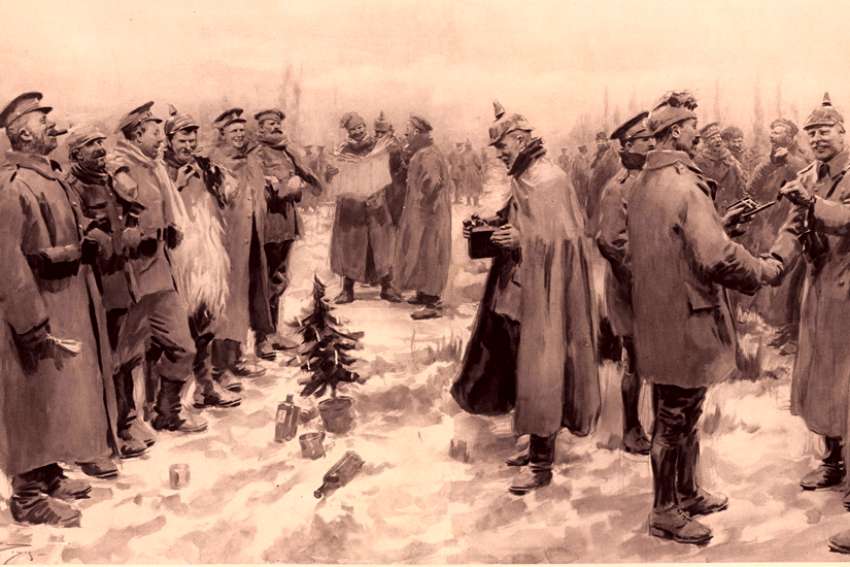Despite claims by individuals, such as Steven Pinker in The Better Nature of our Angels, that we live in the most peaceful era in human history, it is hard not to be overwhelmed by the stories of war that fill our screens. It is impossible to remain immune to the images of suffering and brutalized migrants that are the result of such atrocities, and difficult, in turn, to hope for better times as we watch prosperous nations closing, instead of opening, their borders to those in need.
All of this was brought into stark relief recently during the Remembrance Day celebrations in Calgary. Each year St. Mary’s University partners with the Field of Crosses project where 3,500 stark wooden crosses are erected to honour the Calgary men and women who lost their lives defending our country. This year, St. Mary’s President’s Volunteer Team (PVT) also placed a candle at every cross.
Standing in the dark the night before the official celebration began, and watching the flickering flames dance as the snow and wind whisked over the specially designed candles, I thought of the cold and dark of the fields of the Western Front, where teenagers shivered in mud-packed trenches waiting for the signal to attack.
In darkness there is sometimes light, and I remembered the beautiful story of the Christmas Truce of 1914 where British, French and German soldiers called a temporary halt to the senseless killing. Defying the order of their commanders, soldiers from each side ventured into the No-Man’s Land that separated them, to embrace, exchange gifts and sing Christmas carols. “Stille Nacht, Heilige Nacht” rang out in different languages from weary voices briefly finding hope. Men exchanged addresses, cigarettes and whiskey. They played football using empty food cans, using their helmets as goal posts, on a 500-mile stretch of neutral ground.
It was Dec. 25, 1914 and the war had been raging for only five months. It would continue until 1918 and over 15 million people would be slaughtered before the Armistice was called. But on that night, humanity rose above the corpse-strewn ground to meet as brothers, however briefly.
One man who survived the war and who was witness to the Christmas Truce was Alfred Anderson. In a lovely report in The Guardian, Anderson explained that he was just 18 at the time, and was too weary to join in the football game. What stood out for him was the silence of the truce.
“All I’d heard for two months in the trenches was the hissing, cracking and whining of bullets in flight, machine gun fire and distant German voices,” he said. “But there was a dead silence that morning, right across the land as far as you could see. We shouted ‘Merry Christmas,’ even though nobody felt merry. The silence ended early in the afternoon and the killing started again. It was a short peace in a terrible war.”
In the haunting ballad based on this unusual chapter of history — “Christmas in the Trenches,” by John McCutcheon — the speaker marvels at a German soldier who strides bravely and “unarmed into the night … His truce flag, like a Christmas star.” Slowly, as he watches, the opposing sides gather together onto neutral ground, an “unlikely band of men.”
Soon enough, though, “they settle back to war,” but every Christmas the surviving soldier in the ballad reminds himself that “the ones who call the shots won’t be among the dead and lame, / And on each end of the rifle we’re the same.”
I’m not sure why this story came to me when writing this Christmas reflection, but it reminded me that despite our remarkable capacity for harm, we do indeed have a preternatural ability to do good. And without a doubt, even in our increasingly secular society, Christmas often stands as the star that calls us to our greater selves.
The birth of Christ is glorious as an all-encompassing sign of hope, and the celebration of this day reminds us of the potential we have to be better versions of ourselves; to reach out and do good for others; and to cross into contested ground to embrace the other and the fallen. Just as Christ did.
Christmas is a Remembrance Day like no other. So remember “to fight the good fight of the faith” and to reach for grace.
(Turcotte is president of St. Mary’s University in Calgary.)


